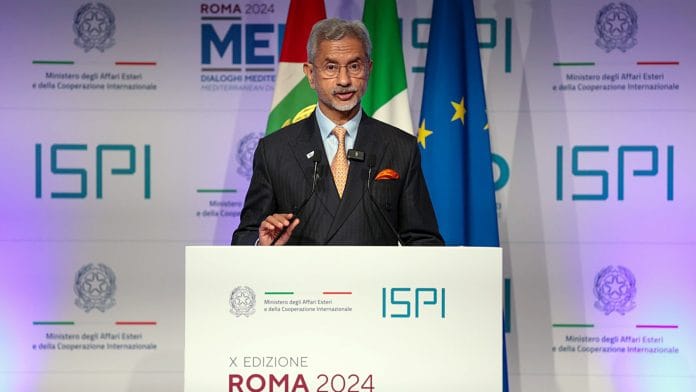New Delhi: From Prime Minister Narendra Modi “personally engaged” with both Moscow and Kyiv to direct the conflict to the path of “dialogue and diplomacy”, to the Indian government staying in touch at the highest levels with Tel Aviv and Tehran—India has taken proactive steps to bring peace to the ongoing global conflicts, External Affairs Minister S. Jaishankar said Monday.
Speaking at the Rome Mediterranean Dialogue 2024, Jaishankar underlined India’s efforts to resolve global conflicts and build resilient supply chains as the global order faces “severe stress”.
On West Asia, the minister said India unequivocally condemns terrorism and hostage taking, and regards large-scale civilian casualties in military operations to be unacceptable.
“International humanitarian law cannot be disregarded. In immediate terms, we should all support a ceasefire. India has also extended relief directly and through UNRWA. In the longer term, it is imperative that the future of the Palestinian people be addressed. India favours a two-state solution,” Jaishankar said.
He added: “Our concerns have also been increasing on the widening of the conflict. We have been in regular touch with both Israel and Iran at the highest levels to advocate restraint and enhance communication. Where Lebanon is concerned, there is an Indian contingent like Italy, that is part of UNIFIL (UN peacekeeping mission in Lebanon).”
The foreign minister is on a three-day trip to Italy from 24 to 26 November. He inaugurated India’s new chancery buildings in Rome Sunday, before addressing the Mediterranean Dialogue.
He also met with his British counterpart David Lammy earlier Monday. He will be attending the outreach session of the G7 foreign ministers’ meeting before returning to India tomorrow.
Also read: As India looks to bolster ties with Greece as part of Europe push, a Chinese wall stands in the way
India’s unique position
In recent weeks, Jaishankar has been publicly talking about the proactiveness of Indian diplomacy in the two major global conflicts because of its unique role of being one of the few countries on good terms with all parties—Moscow, Kyiv, Tehran and Tel Aviv.
India maintains economic ties with Iran, and has recently signed an agreement for the development of infrastructure at Chabahar port. With Tel Aviv, India has deep defence and strategic ties, including being a member of I2U2—India, Israel, the US and the UAE—a grouping which found mention in Jaishankar’s address in Rome.
The conflict in West Asia began on 7 October 2023, when Hamas—the militant group in control of the Gaza Strip—attacked Israel killing nearly 1,200 Israelis and taking another 250 people as hostages.
Tel Aviv’s retaliation has killed roughly 44,000 Palestinians and left swathes of Gaza destroyed. In the last two months, Israel has also stepped up attacks on Hezbollah in Lebanon, and killed its top leaders.
Both Hamas and Hezbollah have long been funded by Iran, which has twice launched strikes at Israel this year—the first time in modern history. The situation has led to another Iranian proxy group, the Houthis in Yemen, to disrupt trade through the Red Sea.
“With regard to the Gulf of Aden and the northern Arabian sea, Indian naval ships have been deployed since last year to protect commercial shipping. Given our capacity to engage various parties, we are always willing to contribute meaningfully to any international diplomatic endeavours,” said Jaishankar on India’s role in ensuring that trade continues to flow through the Suez Canal.
On the Russia-Ukraine war, which is nearing its third year, Jaishankar reiterated India’s long-standing position that “disputes in this era cannot be settled by war”.
“There must be a return to dialogue and diplomacy, the sooner the better. This is a widespread sentiment in the world today, especially in the Global South. Since June this year, Prime Minister Narendra Modi has personally engaged leaders of both Russia and Ukraine to this end,” he said.
Modi visited Moscow in July this year as part of the annual India-Russia summit, where he met Russian President Vladimir Putin. This was followed by a historic visit to Kyiv in August, the first by an Indian Prime Minister, where Modi held a bilateral meeting with Ukrainian President Volodymyr Zelenskyy.
The following month, Modi met Zelenskyy on the sidelines of the United Nations Summit of the Future, before meeting Putin on the margins of the BRICS summit in the Russian city of Kazan last month.
Importance of India in the Mediterranean
As a part of his address, Jaishankar highlighted how India’s total trade with the Mediterranean, estimated at around $80 billion, is poised to grow, especially as New Delhi deepens its engagement with West Asia in the next few years.
“We have a diaspora here of 460,000. About 40 percent of that is in Italy. Our key interests are in fertilizers, energy, water technology, diamonds, defence and cyber. India has significant projects underway – airports, ports, railway, steel, green hydrogen, phosphates and submarine cables,” Jaishankar said.
Adding to these ties is the potential “game changer” of the India-Middle East-Europe Economic Corridor (IMEEC), which aims to connect India to Europe via West Asia. The project, first announced in September 2023 on the margins of the G20 Leaders’ Summit in New Delhi, has in the short-term faced setbacks due to the ongoing conflict in West Asia.
However, on the “eastern” part of the corridor, Jaishankar said work had been ongoing, especially between India, Saudi Arabia and the UAE.
(Edited by Tikli Basu)
Also read: ‘Uranium, crude oil, & coal’: Jaishankar on why trade with Russia is critical for India






